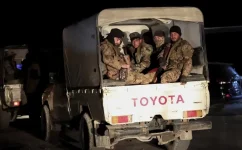Fighting broke out between new Syrian rulers and fighters still loyal to former President Assad. The worst violence since rebels kicked Assad out last December has killed more than 70 people, according to a British monitoring group. Officials set up a curfew in coastal cities Latakia and Tartous where most fighting happened.
People also report clashes in Homs and Aleppo. BBC Verify found videos showing gunmen shooting at a building in Homs Thursday evening, starting a fire inside. Everything began when government forces fell into an ambush during security operations in Latakia. The government sent extra troops to help.
This coastal area serves as the home base for the Alawite minority group, including the Assad family. Different sources report various death counts that the BBC cannot confirm independently. The Syrian Observatory for Human Rights counted 71 dead by Friday - 35 government soldiers, 32 former regime fighters, and four regular citizens.
Many people suffered injuries during these battles. Former regime supporters ambushed military forces, checkpoints, and headquarters along the coast. Local fighters took control of military zones, hiding in mountain areas to launch attacks. Others set up positions inside Jableh city.
Former regime soldiers spread throughout coastal towns. The step news agency reported Thursday that government forces killed about 70 former regime fighters and captured 25 more in Jableh. Defense ministry spokesman Colonel Hassan Abdul Ghani warned Assad supporters through state media.
"Thousands decided to surrender their weapons and return home. Some insist on running away and dying to defend killers and criminals. The choice looks clear: drop your weapons or face certain death," he stated. Interim president Ahmed al-Sharaa faces serious security problems in this region.
Alawite activists claim their community has suffered attacks since Assad fell, especially in rural Homs and Latakia. The president also deals with resistance from Druze forces in southern Syria. Earlier this week, Syria's foreign minister told international chemical weapons officials that the new government promises to destroy any remaining stockpiles from Assad's time.
Assad always denied using chemical weapons during the 14-year civil war. However, many activists accused his government of dozens of chemical attacks against civilians. The current fighting represents the biggest test yet for Syria's new leadership as they try to stabilize the country.
People also report clashes in Homs and Aleppo. BBC Verify found videos showing gunmen shooting at a building in Homs Thursday evening, starting a fire inside. Everything began when government forces fell into an ambush during security operations in Latakia. The government sent extra troops to help.
This coastal area serves as the home base for the Alawite minority group, including the Assad family. Different sources report various death counts that the BBC cannot confirm independently. The Syrian Observatory for Human Rights counted 71 dead by Friday - 35 government soldiers, 32 former regime fighters, and four regular citizens.
Many people suffered injuries during these battles. Former regime supporters ambushed military forces, checkpoints, and headquarters along the coast. Local fighters took control of military zones, hiding in mountain areas to launch attacks. Others set up positions inside Jableh city.
Former regime soldiers spread throughout coastal towns. The step news agency reported Thursday that government forces killed about 70 former regime fighters and captured 25 more in Jableh. Defense ministry spokesman Colonel Hassan Abdul Ghani warned Assad supporters through state media.
"Thousands decided to surrender their weapons and return home. Some insist on running away and dying to defend killers and criminals. The choice looks clear: drop your weapons or face certain death," he stated. Interim president Ahmed al-Sharaa faces serious security problems in this region.
Alawite activists claim their community has suffered attacks since Assad fell, especially in rural Homs and Latakia. The president also deals with resistance from Druze forces in southern Syria. Earlier this week, Syria's foreign minister told international chemical weapons officials that the new government promises to destroy any remaining stockpiles from Assad's time.
Assad always denied using chemical weapons during the 14-year civil war. However, many activists accused his government of dozens of chemical attacks against civilians. The current fighting represents the biggest test yet for Syria's new leadership as they try to stabilize the country.












